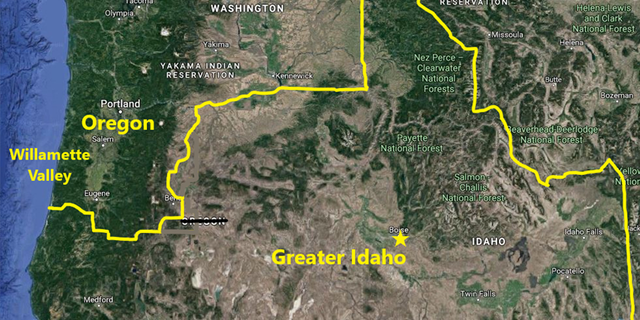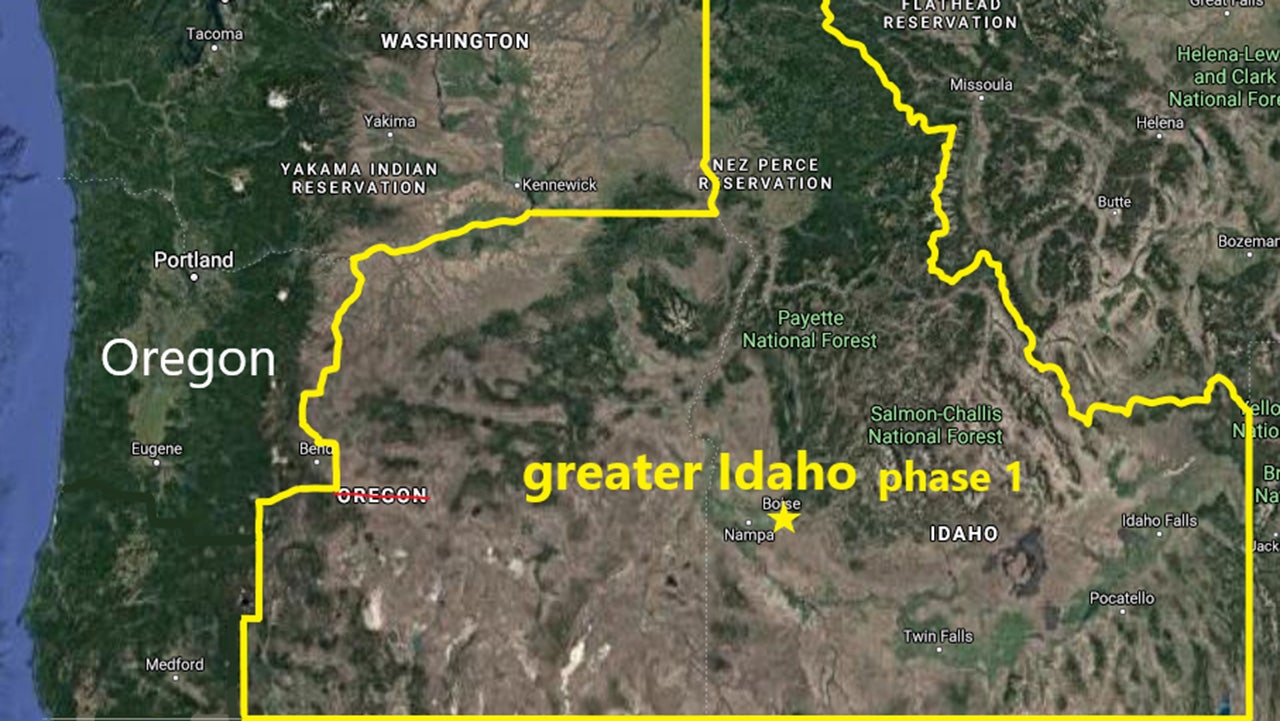Leftists are destroying our country
LINK: Idaho legislature pushing bill to open talks about moving border between western states
A campaign to have rural eastern Oregon effectively secede from the blue state and join more conservative Idaho is gaining steam as leaders from both states express support for relocating the border between them.
Former Oregon House Speaker Mark Simmons penned an op-ed in the Idaho Statesman, a daily newspaper, over the weekend to explain why he supports the so-called Greater Idaho movement, which seeks to incorporate about 13 Oregon counties, or 63% of the state's landmass and 9% of its population, within Idaho's borders.
"Idaho would have the satisfaction of freeing rural, conservative communities from progressive blue-state law," wrote Simmons. "We are dismayed by the manner in which Oregon government has marginalized our values and villainized our resource-based livelihoods. This is why our counties voted 75% Republican last year (Idaho voted 67% Republican)."
Simmons described how Oregon stores are selling drugs near Idaho communities and hurting the quality of life in the area, explaining that moving the state line would force drug shops away from most of Idaho's population and help eastern Oregonians.
"These counties would help maintain rural values in the Idaho Legislature, values of faith, family, and self-reliance," he argued. "All of eastern Oregon voted against marijuana legalization and the decriminalization of hard drugs."
Simmons' op-ed came after Idaho's House of Representatives earlier this month passed a resolution not to move the Idaho-Oregon border but rather to call for formal talks between the states' legislatures about relocating the boundary line.
It's unclear if the bill will pass the Idaho Senate, but the chamber is, like the state's House, dominated by Republicans.
Matt McCaw, a spokesperson for the Greater Idaho group, has said he's confident the measure will pass, expressing optimism about the movement's goals amid skepticism from many people.
"When you have a new idea, there's always a lot of people that roll their eyes. They think it's silly, they dismiss it," he told KGW, an NBC affiliate in Oregon. "When we started this two years ago, I would get that a lot. Like, 'This will never happen, why are you wasting your time?'"
Others have expressed doubt, including some lawmakers who voted for the measure approving talks.
"The reality is, I don't believe this will ever happen," said Idaho Republican Rep. Lance Clow.
Rep. Colin Nash, a Democrat, jokingly asked for permission to amend the proposal to also add all of Montana to Idaho, quipping that doing so could be enough to allow Idaho to pick up a Democratic seat in Congress.
Moving the Idaho-Oregon border would require the approval of both state legislatures as well as the U.S. Congress. Despite the support of Idaho lawmakers, the idea may face greater resistance in the Democrat-controlled Oregon legislature. Oregon state Sen. Dennis Linthicum, a Republican, has filed a similar proposal to begin talks with Idaho, but the proposal is unlikely to make it out of committee.
Still, proponents of Greater Idaho note that 11 counties in eastern Oregon have voted for ballot measures to explore the move and that, according to some polling, Idahoans would welcome expanding the state boundary. In Oregon, meanwhile, polling has shown a roughly equal number of voters support and oppose the idea, with about one-fifth of the population undecided.
Some critics have warned against "self-segregating by ideology," saying the creation of a Greater Idaho would fuel division and disgruntled residents can move if they're unhappy with how their state is governing. Others say Idaho legislators should be focusing on their own state rather than helping Oregon residents. Another concern is that sparsely populated areas have high rates of Medicaid enrollment and could be an added expense to Idaho taxpayers.

However, a recent analysis by the Claremont Institute found the state-line shift could benefit Idaho economically, providing an annual net benefit to Idaho's state government budget of $170 million.
"Many people are moving to Idaho to gain political refuge from blue states," wrote Simmons. "Adding a large part of Oregon to Idaho would take some pressure off of Idaho's current housing market by giving new people more locations to choose from. It would reduce traffic congestion and reduce the loss of Idaho farmland to suburban housing."
As for Oregon, proponents of the change say it would save the state money and allow the state to govern as liberally as it wants without obstruction from its conservative counties.
Beyond drugs, economics and politics, the key motivation beyond the Greater Idaho movement is about preserving a certain way of life and being properly represented by the state's lawmakers.
"For a long time, there's been this urban-rural divide," said McCaw. "People on the east side of the state have felt like their state-level government has not heard them, has not understood their way of life, their values, their problems, and has enacted policy that doesn't work for us in eastern Oregon."
A "Greater Idaho" would be as big as Montana and twice as populous, with the new land increasing the state's population by about 21%.
LINK: Idaho legislature pushing bill to open talks about moving border between western states
A campaign to have rural eastern Oregon effectively secede from the blue state and join more conservative Idaho is gaining steam as leaders from both states express support for relocating the border between them.
Former Oregon House Speaker Mark Simmons penned an op-ed in the Idaho Statesman, a daily newspaper, over the weekend to explain why he supports the so-called Greater Idaho movement, which seeks to incorporate about 13 Oregon counties, or 63% of the state's landmass and 9% of its population, within Idaho's borders.
"Idaho would have the satisfaction of freeing rural, conservative communities from progressive blue-state law," wrote Simmons. "We are dismayed by the manner in which Oregon government has marginalized our values and villainized our resource-based livelihoods. This is why our counties voted 75% Republican last year (Idaho voted 67% Republican)."
Simmons described how Oregon stores are selling drugs near Idaho communities and hurting the quality of life in the area, explaining that moving the state line would force drug shops away from most of Idaho's population and help eastern Oregonians.
"These counties would help maintain rural values in the Idaho Legislature, values of faith, family, and self-reliance," he argued. "All of eastern Oregon voted against marijuana legalization and the decriminalization of hard drugs."
Simmons' op-ed came after Idaho's House of Representatives earlier this month passed a resolution not to move the Idaho-Oregon border but rather to call for formal talks between the states' legislatures about relocating the boundary line.
It's unclear if the bill will pass the Idaho Senate, but the chamber is, like the state's House, dominated by Republicans.
Matt McCaw, a spokesperson for the Greater Idaho group, has said he's confident the measure will pass, expressing optimism about the movement's goals amid skepticism from many people.
"When you have a new idea, there's always a lot of people that roll their eyes. They think it's silly, they dismiss it," he told KGW, an NBC affiliate in Oregon. "When we started this two years ago, I would get that a lot. Like, 'This will never happen, why are you wasting your time?'"
Others have expressed doubt, including some lawmakers who voted for the measure approving talks.
"The reality is, I don't believe this will ever happen," said Idaho Republican Rep. Lance Clow.
Rep. Colin Nash, a Democrat, jokingly asked for permission to amend the proposal to also add all of Montana to Idaho, quipping that doing so could be enough to allow Idaho to pick up a Democratic seat in Congress.
Moving the Idaho-Oregon border would require the approval of both state legislatures as well as the U.S. Congress. Despite the support of Idaho lawmakers, the idea may face greater resistance in the Democrat-controlled Oregon legislature. Oregon state Sen. Dennis Linthicum, a Republican, has filed a similar proposal to begin talks with Idaho, but the proposal is unlikely to make it out of committee.
Still, proponents of Greater Idaho note that 11 counties in eastern Oregon have voted for ballot measures to explore the move and that, according to some polling, Idahoans would welcome expanding the state boundary. In Oregon, meanwhile, polling has shown a roughly equal number of voters support and oppose the idea, with about one-fifth of the population undecided.
Some critics have warned against "self-segregating by ideology," saying the creation of a Greater Idaho would fuel division and disgruntled residents can move if they're unhappy with how their state is governing. Others say Idaho legislators should be focusing on their own state rather than helping Oregon residents. Another concern is that sparsely populated areas have high rates of Medicaid enrollment and could be an added expense to Idaho taxpayers.

However, a recent analysis by the Claremont Institute found the state-line shift could benefit Idaho economically, providing an annual net benefit to Idaho's state government budget of $170 million.
"Many people are moving to Idaho to gain political refuge from blue states," wrote Simmons. "Adding a large part of Oregon to Idaho would take some pressure off of Idaho's current housing market by giving new people more locations to choose from. It would reduce traffic congestion and reduce the loss of Idaho farmland to suburban housing."
As for Oregon, proponents of the change say it would save the state money and allow the state to govern as liberally as it wants without obstruction from its conservative counties.
Beyond drugs, economics and politics, the key motivation beyond the Greater Idaho movement is about preserving a certain way of life and being properly represented by the state's lawmakers.
"For a long time, there's been this urban-rural divide," said McCaw. "People on the east side of the state have felt like their state-level government has not heard them, has not understood their way of life, their values, their problems, and has enacted policy that doesn't work for us in eastern Oregon."
A "Greater Idaho" would be as big as Montana and twice as populous, with the new land increasing the state's population by about 21%.


